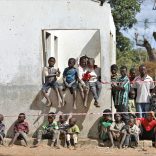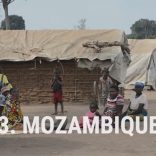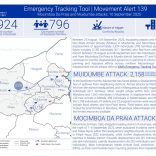Mozambique: Chapo praises the excellence of the Aga Khan Academy and advocates the expansion of the ...
Cyclone Kenneth: Only 23% of the money needed to support Mozambique was obtained

File photo: DW
More than 390,000 people have received assistance in the year since tropical cyclone Kenneth hit northern Mozambique, but only 23% of the financial support needed for the region was obtained, a UN survey reveals.
A total expected budget of US$113 million (€104 million) would have been consumed responding to post-Kenneth humanitarian support budget until May this year, including responding to the violence caused by armed groups in the region and excluding government funds.
“One year after Tropical Cyclone Kenneth struck Cabo Delgado in Mozambique on 25 April 2019, more than 390,000 people have received critical assistance, such as food, clean water and shelter.,” the UN says.
But the situation in the region “has deteriorated in recent months”. “Floods in December 2019 and January 2020 displaced thousands of people and damaged key infrastructure, exacerbating the needs of over 200,000 people still living in destroyed or damaged homes and another 6,600 people still sheltering in tents.,” the survey continues.

Insecurity in Cabo Delgado
At the same time, there are health alerts. In February, a cholera outbreak was declared on the island of Ibo and in the districts of Macomia and Mocímboa da Praia, home to the largest construction project in the country, the Area1 gas mega-project, also the epicentre of the country’s Covid-19 infections.
“All of this happens against the background of insecurity in Cabo Delgado which has already affected at least 162,000 people and causes successive displacements, including in areas still struggling to recover from Cyclone Kenneth,” the UN report adds.
The United Nations Central Emergency Response Fund had already allocated US$10 million in response to Cyclone Kenneth, and this month allocated an additional US$7 million.
Cyclone Kenneth hit Mozambique in April 2019 and killed 45 people in the north of the country.
Humanitarian response must last longer and be more resilient
The humanitarian response to natural disasters such as Cyclone Kenneth has to change and start rebuilding communities more effectively, rather than leaving them vulnerable as before, a report by the Institute for Social and Environmental-International Transition (ISET) warns.
According to the document, support should stay longer and be more transformative, instead of providing only emergency assistance. “Especially in the face of climate change, we need to make a faster transition from our initial humanitarian response to a holistic response that integrates risk reduction and development promotion in the long term,” the report, entitled “When The Unprecedented Becomes Precedented: Learning from Cyclones Idai and Kenneth“ proposes.
One of the objectives of the document is to not let the cyclones of 2019 be forgotten, but for them to teach lessons, listed and detailed by the authors. The report recognises that “in countries where the vulnerability of socio-economic conditions converges with the natural degradation of the environment and a changing climate, the process of building with resilience and reducing risks will be long and arduous, but necessary”.
The authors argue that it is important to “interrupt cycles of poverty and to prevent communities from retreating to previous states of vulnerability” every time there is a natural disaster, and transform humanitarian aid into an engine of irreversible progress.
According to the survey carried out in Mozambique after Cyclones Kenneth and Idai – including, in the latter case, Zimbabwe and Malawi – the NGO says that it will be necessary “to change practices at community level, through diversification of livelihoods, facilitating the building of shelters, working with communities to develop inclusive warning systems and improve the location of maintenance equipment”.












Leave a Reply
Be the First to Comment!
You must be logged in to post a comment.
You must be logged in to post a comment.